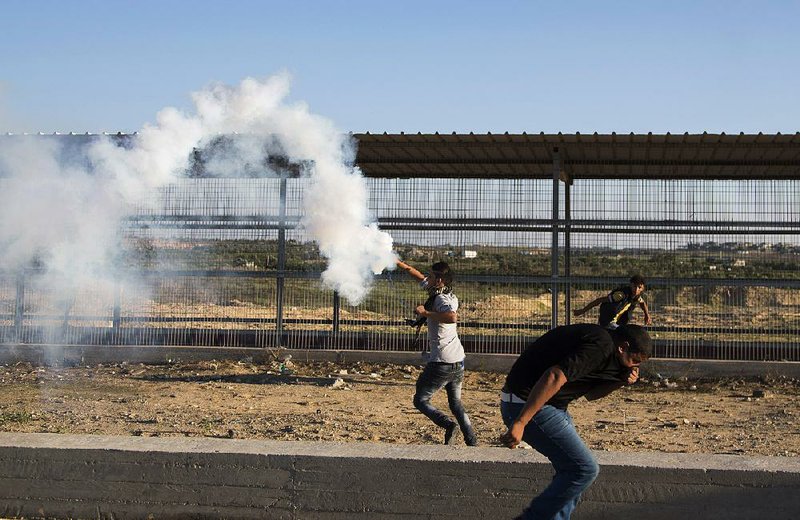RAMALLAH, West Bank -- A Palestinian who stabbed and wounded an American man at a station of Jerusalem's light rail on Friday was shot dead by police, security guards and civilians, police said. An Israeli man was wounded in the crossfire.
In the West Bank, two Palestinians carrying knives ran toward an Israeli checkpoint, drawing fire from troops who killed one and critically wounded the other, according to police and a Palestinian medic.
Friday's attacks were the latest in a series of Palestinian attacks that began in mid-September and were accompanied by widespread unrest, including clashes between Palestinian stone-throwers and Israeli troops.
There were no further details on the identity of the American.
In all, 11 Israelis have been killed in Palestinian attacks, mostly stabbings, and 66 Palestinians died by Israeli fire in the past six weeks. Forty of the Palestinians killed were said by Israel to have been involved in attacks or attempted attacks. Nineteen Palestinians were wounded by Israeli fire in West Bank clashes Friday, the Palestinian Health Ministry said.
Israel has blamed Palestinian attacks on what it says is anti-Israel incitement by Palestinian political and religious leaders. Palestinians say the violence is largely driven by the hopelessness many Palestinians feel after nearly half a century of Israeli military rule, with no end in sight.
Meanwhile, Palestinian President Mahmoud Abbas, Foreign Minister Riad Malki and senior Abbas aide Saeb Erekat met Friday with the prosecutor of the International Criminal Court at the court's headquarters in The Hague, Netherlands, to hand over documentation on the recent violence, Erekat's office said.
Earlier, the Palestinians said they would submit 52 pages detailing what Erekat's office described as extrajudicial executions of Palestinians by Israeli troops, as well as home demolitions and other forms of collective punishment. The documents were to be accompanied by video footage of some of the events, the statement said.
Rights groups have accused Israeli troops of using excessive force in some of the cases, a charge Israel's military has denied.
The court's preliminary probe aims to establish if there are grounds to open a full-scale investigation. It is unclear when it will be completed.
Malki said Friday that he wants the court to finish it quickly to deter further deaths.
If Israel "feels impunity and there is no process of accountability, then what will deter Israel from multiplying the numbers of victims" each day? he asked. "I think it's important for Israel to get messages -- clear messages and strong messages -- and that's why we are pushing for expediting the preliminary examination."
There was no immediate comment from Israel on the Palestinians' actions. The Palestinian Authority has joined the Hague-based court. Israel is not a member and rejects the court's authority.
In the West Bank city of Hebron, Israeli forces imposed new restrictions on Palestinians in the Israeli-controlled center of Hebron, residents said.
The military barred Palestinians between the ages of 15 and 25 from entering a major Hebron shrine that is revered by both Muslims and Jews, said senior Muslim cleric Munther Abu Felat. He said age restrictions were enforced only partially.
In recent days, Hebron has become a flash point of Israeli-Palestinian violence, with near-daily deadly confrontations at Israeli checkpoints that guard ultranationalist Jewish settlers in the center of the city. In these attacks, Palestinians have been shot dead after the military said they stabbed or tried to stab soldiers.
Also on Friday, Israeli Prime Minister Benjamin Netanyahu issued a statement retracting his accusation that it was a Palestinian cleric who gave Hitler the idea of annihilating Europe's Jews during World War II, comments that drew local and international condemnation.
Netanyahu, criticized even by Israeli historians for distorting facts, had already said he never intended to absolve Hitler of responsibility for the Holocaust by blaming the mufti of Jerusalem, Haj Amin al-Husseini, but the new statement went further.
"The decision to move from a policy of deporting Jews to the Final Solution was made by the Nazis and was not dependent on outside influence," Netanyahu posted on Facebook in Hebrew and English. "The Nazis saw in the Mufti a collaborator, but they did not need him to decide on the systematic destruction of European Jewry, which began in June 1941."
That description aligns with the prevailing view of Holocaust historians but was contradicted by Netanyahu in a speech Oct. 20 to the World Zionist Congress, where he recounted the meeting between Hitler and al-Husseini.
"Hitler didn't want to exterminate the Jews at the time, he wanted to expel the Jews," Netanyahu said in his speech. He quoted the mufti as saying "If you expel them, they'll all come here," referring to Palestine, and then said Hitler asked, "So what should I do with them?" The mufti replied, "Burn them," according to Netanyahu.
Netanyahu wrote in the Facebook post that his initial "remarks were intended to illustrate the murderous approach of the mufti to the Jews in his lengthy contacts with the Nazi leadership."
Information for this article was contributed by Mohammed Daraghmeh and Mike Corder of The Associated Press and by Jodi Rudoren of The New York Times.
A Section on 10/31/2015

